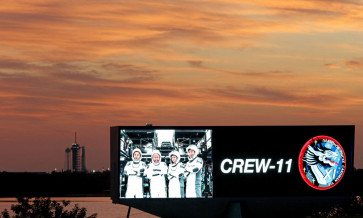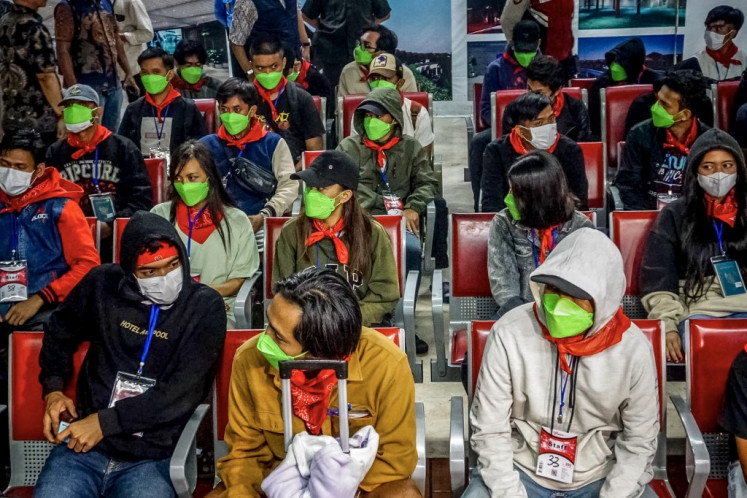Popular Reads
Top Results
Can't find what you're looking for?
View all search resultsPopular Reads
Top Results
Can't find what you're looking for?
View all search resultsGovt embarks on a bumpy ride with electric automobiles
(Antara/Prasetyo Utomo) The government has set an ambitious target to begin the mass production of electric automobiles in 2014, but doubts prevail among industry experts over the feasibility of the target
Change text size
Gift Premium Articles
to Anyone
(Antara/Prasetyo Utomo)
The government has set an ambitious target to begin the mass production of electric automobiles in 2014, but doubts prevail among industry experts over the feasibility of the target.
Coordinating Economic Minister Hatta Rajasa tested an electric car on Monday after a meeting at his office discussing the national electric cars program. One prototype is a minibus made by the Indonesian Institute of
Sciences (LIPI) and the Research and Technology Ministry. Another one is a car usually driven by State-Owned Enterprises Minister Dahlan Iskan, made by PT Sarimas Ahmadi Pratama, owned by the maker of the car, Dasep Ahmadi.
Hatta said the government would set up a research and development center for such “green cars”. The center would be comprised of people from the Research and Technology Ministry, Industry Ministry, Transportation Ministry and State-Owned Enterprises Ministry.
“The initial batch of production will be 10,000 units,” he said. “We are going to introduce incentives to lure the private sector to participate and to invest in the program.”
Nonetheless, questions from industry players abound. “I personally see this electric car program as premature,” Institute for Essential Services Reform’s energy expert Fabby Tumiwa said on Monday.
“First of all, we do not have sufficient access to the technology. The current development of electric cars is mostly conducted on individual levels without proper professional testing,” he added.
Fabby said Indonesia had yet to achieve technological access to properly develop the batteries needed for electric cars. “Indonesia will need a long time to gain access to the electric car battery technology because there is a lot of research and development involved,” he said.
“Finally, the government has never disclosed a clear business plan for the electric car program. What is the price? What is the technology that will be applied? Do we have sufficient supporting infrastructure for the industry? Who is our target market? This project is premature from all sides,” he added.
Indonesian Motorcycle Industry Association (AISI) chairman Gunadi Sindhuwinata said the government needed to be more realistic regarding its ambition.
“To properly develop the automotive industry, we need sufficient engineering resources, a capacity for manufacturing and a vast amount of financing along with a targeted market,” Gunadi said.
“Our engineering capability remains unclear, while on the manufacturing side, do we have enough of a supporting industry to produce locally made spare parts as well?” he added.
“Therefore, I believe this ambition needs to be reinforced with the nation’s objective capability. The planning must be comprehensively conducted. Even a sophisticated automotive industry needs at least five years to produce a new type of car. We should not rush this electric car project and fall into an empty euphoria,” he said further.
The electric car program is part of the government’s efforts to promote environmentally friendly and fuel-saving vehicles to significantly reduce energy subsidies in the state budget.
The government had spent Rp 88.9 trillion (US$9.42 billion) on the fuel subsidy in the first six months of the year, or 64.7 percent of the overall Rp 137.4 trillion budget for the whole year, according to Finance Ministry data.
But the ministry has estimated it will spend Rp 127.9 trillion more in the second half, boosting the fuel subsidy up to Rp 216.8 trillion, 57.8 percent more than the initial allocation.
The House in April rejected a government proposal to cut the subsidy by increasing fuel prices by 30 percent to Rp 6,000 per liter, except if oil prices reached a certain threshold.
The government allocated Rp 168.7 trillion for capital or infrastructure spending this year, of which only 18.2 percent, or Rp 30.6 trillion, was spent from January to June this year.










